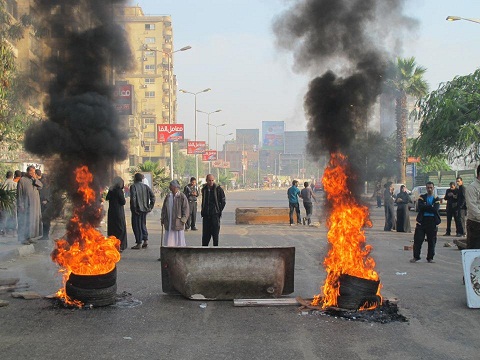Resident complaints about violations end in crackdown
CAIRO: An intensified crackdown on coffee shops during the Ramadan and Eid Al-Fitr period has left shop owners with major financial losses and the residents of the buildings in which the shops are located satisfied.
Starting mid-Ramadan, authorities in Cairo and Giza led campaigns to shut down unlicensed coffee shops. Those located on El-Nozha Street behind City Stars Mall suffered one of the greatest losses in what were described as violent and savage crackdowns.
While the campaign was justified in the state-run press as legitimate law enforcement to punish law violators and protect the residents of the buildings hosting these cafés, the coffee shop owners had a different story to tell.
They should have issued a warning 15 days before coming, says Samer El-Waziri, a coffee shop owner in the Nozha block, which is said to have approximately 70 cafés, only two of which are licensed.
They should have told us what we were doing wrong, he adds. We ve been open for five years and no [official] has even talked with us [regarding the alleged violations that led to the crackdown].
According to official sources quoted in Al-Ahram, the Cairo governorate hasn t issued a license to operate a coffee shop since 2001, but this hasn t stopped the increasing numbers.
Coffee shops are considered to be lucrative businesses, as more people, especially in the 15-25 age group, go out regularly. There is no better proof than the always packed cafés, whether in the Nozha block or elsewhere.
The state-run paper states that the residents of the buildings hosting these cafés have filed many complaints citing environmental, noise-related and moral concerns.
The shisha smoke emitting from the large number of café dwellers isn t healthy, building residents reportedly asserted, in addition to citing fire hazards. These coffee shops attract immoral practices, and feature women smoking shisha, building residents said.
Although they don’t have a license, all the other paperwork acknowledges the commercial nature of these shops, says Ahmed Mohamed, another shop owner in the block.
He says the tax reports and other similar documents, approved by government offices apart from the district authorities, indicate that he operates a restaurant. This was taken as a sign that the license would be acquired in the future, he adds.
El-Waziri explains that the paperwork of most of the facilities indicate that they operate a commercial activity without specifying its nature. But taxes and electric and water bills have been paid and inspections by health authorities have been made, he adds.
I support the people that have complained, says Mohamed, There were violators who made noise. But there are also others who didn t even put a chair outside their specified areas.
The problem for most of the owners is that the authorities didn t differentiate between those who made the residents complain and the others. Lumped together with the violators, all the owners saw their shops, not only closed, but also destroyed by the authorities and their equipment confiscated.
Although the report published by Al-Ahram says that only chairs and shishas were confiscated, El-Waziri notes that expensive equipment like plasma screens were also taken by authorities.
Mohamed estimates the financial losses sustained by the Nozha block café owners to reach LE 4 million in total. This is in addition to the losses of closing down the shops and the loss of many customers who were turned-off by the continuous crackdowns that disrupted their outings. Some have reopened to resume business or to make sure that what remains of their equipment doesn’t get stolen.
Three thousand people work in these cafés, 1,200 of which are married and support 1,900 children, says El-Waziri. The owners are now joining efforts to find a solution to their dilemma. One of the efforts is to collect data about their business to help them defend their case.
There are many solutions, he states. One is to reopen the shops with a code of honor, ensuring that they will avoid any violations or disturbances. We broke no rule in the first place, he adds.
Another solution is to relocate these cafés to another area similar to cafés in malls, he says.
